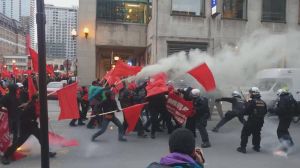Delhi is currently under siege by what some are calling its worst air quality crisis yet, as the city grapples with alarming smog and pollution levels. Residents woke up recently to find the Air Quality Index (AQI) soaring to catastrophic numbers, with some areas reporting readings as high as 500, categorizing the air as 'severe'. This is the first time this season the AQI has breached the 400 mark, and it's sending everyday life spiraling out of control for millions.
The Commission for Air Quality Management (CAQM) notes the grave situation, pointing out the staggering pollution levels—30 to 35 times the limit recommended by the World Health Organization (WHO). Particularly brutal statistics indicate Delhi is now the world's second most polluted city after Lahore, Pakistan, contributing to India's rank as the third-most polluted country globally, following predominantly polluted neighbors like Bangladesh and Pakistan.
During winter months, Delhi typically struggles with such environmental conditions, especially between October and January. This period is marked by low temperatures, dust, vehicle emissions, and smoke from crop burning, compounded this year by persistent dense fog. The fog acts as a trap, holding pollutants closer to the ground and causing air quality to plummet. Meteorologists are warning of no immediate relief, predicting this chaos might only worsen.
To add another layer of urgency, the government has been considering strict measures under the Graded Response Action Plan (GRAP), which, if activated, could lead to the closure of schools for children up to Class 5. The CAQM had previously indicated they were not yet ready to enforce the stringent Stage III measures of GRAP, which allows such closures and bans construction and demolition activities.
Despite these alarming conditions, there has been resistance from political factions calling for immediate action. The Delhi BJP leadership is raising its voice, demanding the Aam Aadmi Party (AAP) government take stronger measures, emphasizing the sustained nature of the pollution problem. Virendra Sachdeva, president of Delhi's BJP, stated, "Air pollution is not just about one day. It's long-term, and the government must take it seriously." This sentiment resonates widely among residents, many of whom are facing health issues due to the toxic air. A survey indicated 81% of families reported at least one member suffering health complications related to pollution.
According to experts, particulate matter (PM2.5) levels are particularly concerning. These minuscule particles can penetrate deep within the respiratory system and are linked to numerous health conditions, ranging from asthma and respiratory infections to heart diseases. The long-term ramifications of living in such conditions can be dire, contributing to over one million deaths annually across India due to air pollution-related illnesses.
Several cities surrounding Delhi—including Noida and Gurgaon—are experiencing similar hazardous conditions, with AQI levels also peaking above 500. The chronic poor air quality has brought about flight delays and cancellations as visibility dropped dramatically.
Adding to the distress is official advice urging residents to limit outdoor activities, particularly sensitive groups like children and the elderly, and to strictly use public transportation to mitigate vehicular emissions contributing to the problem.
With the urban population soaring and industrial growth on the rise, pollution control measures are often weakly enforced. Industrial operations frequently overlook air quality regulations, and rapid construction projects continue unabated, releasing pollutants without adequate checks. Poor handling of waste disposal, largely from agriculture and urban sectors, adds fuel to the already raging fire of air quality deterioration.
The crisis has ignited discussions not just among residents but also on platforms of international discourse, emphasizing urgent and effective action. Copious satellite images have surfaced, even from NASA, illustrating the vast spread of smog blanketing northern India and Pakistan. Such visuals grip the attention of the world, making it evident just how severe the air quality crisis has become.
Currently, authorities are poised for action. The CAQM monitors daily pollution trends closely, with hopes of seeing improvements. Some forecasts suggest stronger winds on the horizon may push the AQI back toward "very poor" levels instead of remaining perpetually within the "severe" range.
The emotional toll on the residents is palpable. Parents worry for their children’s health and education as discussions about school closures loom large. The government has yet to finalize its decision on school operations, with officials echoing the need for clear communication as the situation develops.
The capital's growing concern for air quality and its long-term impacts is becoming increasingly evident. Mental health experts highlight the strain this crisis places on individuals, noting anxiety linked to health risks and economic ramifications affects not only climate policy but the public sentiment at large.
So what can we do? Experts are currently proposing three measures to alleviate the crisis: investment and faster implementation of pollution control technologies; revising and adapting policies to prioritize air quality over mere economic growth; and building stronger alliances between government and community organizations to advocate for cleaner air.
The air quality crisis has positioned itself at the forefront of governing policies, urban planning, and public health discussions—pointing to the convergence of climate change and human health as we move forward. The crisis touching lives every moment calls for immediate attention, demanding collaboration and action across all societal sectors.
Residents must remain engaged and informed to navigate through the murky cloud of hazard hanging ominously over Delhi. Pressures mount on officials to manage conditions with urgency, as every breath taken under these air quality readings poses inhospitable challenges to life and living.
To combat the pollution crisis effectively, citizens must galvanize efforts for change, pressing for accountability and sustainable practices from both local authorities and larger governing bodies. The fight for cleaner air has now become imperative.



